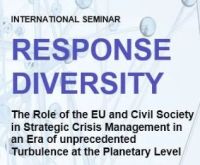International Seminar on Response Diversity

Title: The role of the EU and Civil Society in Strategic Crisis Management in an Era of unprecedented Turbulence at the Planetary Level
Convened as the 16th Meeting of the Brussels Dialogue on Climate Diplomacy
Date: 24 November 2023
Location: European Economic and Social Committee, Brussels, Belgium
Type: Hybrid / Live streamed
Organisers: Environment & Development Resource Centre, the Scientific Advice Mechanism to the European Commission and the Stockholm Resilience Centre in partnership with the European Economic and Social Committee with the participation of the Brussels Dialogue on Climate Diplomacy and GLOBE European Union
Event Page: https://www.brusselsdialogue.net/bdcd-meetings/international-seminar-on-response-diversity
Status: By invitation / Participation requests welcomed
Description: As we enter an era of unprecedented turbulence at the planetary level, we urgently need to rethink our crisis management theories, principles, and practices to be fit for purpose in the twenty-first century.
The way we respond to threats to our society is no longer enough for an interconnected, globalised and rapidly changing world. As crises become more complex, their effects can cascade and ripple to all parts of society, the economy, and the environment. They overlap and amplify each other. Their effects are not limited to specific geographical regions or sectors of society, and many continue indefinitely.
Based on the latest scientific evidence, leading experts from across Europe — including the Group of Chief Scientific Advisors to the European Commission — argue that response diversity is one of the key measures needed now.
Response diversity is an important component of resilience and represents the range of different options available to respond to disruptions and threats in general. This is a challenging concept in times when societies often strive to increase efficiency by removing redundancies — but in a dynamic and uncertain world, redundancies and diversity provide multiple options for responding to new and unexpected crises.
The purpose of the event was to discuss how the European Union and its member states could develop proactive measures to deal with multiple and interacting crises, and how the concept of response diversity could be interpreted and implemented in European policy.
Participants: the hybrid seminar included European and international policy makers professionals active in crisis management and prevention, civil society representatives and academics.
TOPICS/Subjects:
- CLIMATE CHANGE
- Resilience
- Vulnerability
- CLIMATE AND SECURITY
- Environmental Security
- Human Security
- National Security